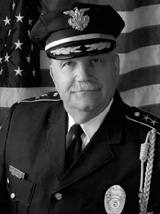 As my first order of business as your president, please let me extend my thanks and appreciation to my fellow IACP members, IACP staff, friends, and family for helping me to achieve this wonderful opportunity. I am humbled and honored to follow in the footsteps of so many fine chiefs who have gone before. I can only hope to honor their past efforts and make this association a little better than I have found it.
As my first order of business as your president, please let me extend my thanks and appreciation to my fellow IACP members, IACP staff, friends, and family for helping me to achieve this wonderful opportunity. I am humbled and honored to follow in the footsteps of so many fine chiefs who have gone before. I can only hope to honor their past efforts and make this association a little better than I have found it.
I have several goals for the coming year, including taking a critical and thorough look at the membership services that IACP provides, and creating a blueprint for the Executive Committee and Board of Officers to follow in the future to make these programs even better and serve you, the membership. I will share these visions as the year progresses.
In this, my first message, I want to concentrate on a bold, new venture that IACP is embarking on. As if the events that fateful September in Washington, Pennsylvania, and New York aren’t enough, over the past three years the world has witnessed horrific attacks in Spain, Israel, Pakistan, Iraq, Saudi Arabia, Chechnya, and many other countries. We are bombarded daily by a host of news stories describing new human tragedies. It’s not hard to imagine that every IACP member, no matter the country or community he or she is serving, wonders where and how terrorism will affect them. Notice I didn’t include when, for I believe we all feel that it is only a matter of time before it affects every one of us.
In 2004 IACP led an examination of policing after September 11, 2001, in collaboration with the National Sheriffs’ Association, the National Organization of Black Law Enforcement Executives, the Major Cities Chiefs, and the Police Foundation. More than 200 law enforcement chief executives contributed to a comprehensive national survey. Dozens more participated in three roundtable conferences focused on the forces and consequences of change that are influencing and redirecting our mission. And although many issues emerged, including recruitment, retention, and fiscal instability, and facilitators struggled to keep participants focused on the variety of issues, the one factor that dominated, and the one the entire world continues to struggle with, is homeland security.
You only have to look at the 2004 Olympics or the Democratic and Republican National Conventions in Boston and New York to see the evidence. Although security has always been a concern at these events, never have the stakes been higher and anxiety more intense than this year. Unprecedented precautions and even carefully considered, but generally accepted curtailment of personal privileges were taken and put in place. Talk to anyone responsible for a major sporting event or public gathering and they will tell you concerns have changed dramatically over the past three years and they all struggle with how to best balance the competing interests.
So as the largest and longest-standing executive policing association in the world, IACP must take a leadership role in spearheading a national, and even international, effort to produce the assets required to build and sustain the capacity of local, state, and tribal law enforcement to move to confront squarely domestic preparedness and security requirements.
This year, IACP will begin to address this monumental task. I will ask the IACP Board of Officers, the Executive Committee, our committees and sections, and the IACP staff to commit to this new national strategy on post-9/11 policing. We will work to forge new, important alliances with our federal partners, strive to find funding sources to achieve these goals, and make sure that our product serves all of law enforcement regardless of size or jurisdiction. And, rest assured, we will be seeking the guidance, counsel, and participation of the membership in the various projects to come.
In undertaking this project, the IACP is embarking on a bold and essential endeavor that is in keeping with the finest traditions of our association. For the last 111 years, the IACP has led the way for police executives in the United States and around the world. It is only fitting that we play a leading role in ensuring that law enforcement agencies around the globe are properly positioned to combat not only crime but also terrorism.


